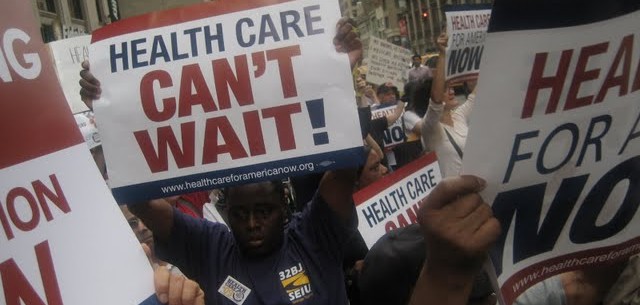The New York State budget process has spilled over into this week (past its April 1st deadline), and is due to wrap-up in the next couple of days. There are still some key health care issues on the table that need one final push, and we urge everyone to contact lawmakers about them.

Here are the outstanding health care issues advocates are supporting:
- Public health insurance eligibility for ALL low-income New Yorkers regardless of immigration status (“Coverage for All”)
- A living wage for health care workers who provide home and community-based long-term care (“Fair Pay for Home Care”)
- Standardizing Medicaid eligibility criteria so that low-income people on Medicare qualify for Medicaid just like everybody else (“Medicare-Medicaid Equality”)
- Fair distribution of Indigent Care Pool funds to only those hospitals deemed “Enhanced Safety Net Providers”, as required by federal law.
- Higher Medicaid rates for health care providers to restore cuts from previous years and provide a long-delayed raise in general.
Here’s how to contact key State leaders to express your opinion on one or more of the above:
- Governor Kathy Hochul: 518-474-8390
- Senate Majority Leader Andrea Stewart-Cousins: 518-455-2585
- Assembly Speaker Carl Heastie: 518-455-3791

Some background on the State-of-Play:
Coverage for All – At the very last minute, Governor Hochul and her Division of the Budget have suddenly asserted that the cost of this provision is much higher than a reputable independent study from the Citizen’s Budget Commission and the Community Service Society of New York, yet she has provided no documentation to back up the claim. Unfortunately, many Albany observers note that Governor Hochul is not supportive of including all immigrants in various proposals to help lower-income people.
Fair Pay for Home Care – Governor Hochul and her Division of the Budget originally proposed that home care workers be provided with one-shot bonuses to attract and retain them as part of the long-term care workforce. The Legislature prefers instead to provide these workers with a permanent pay raise. New York’s current home care workforce is woefully inadequate, to the point where thousands of frail and disabled New Yorkers have been approved for such services but there is literally no one ready to provide the care because the salaries are too low to draw and keep people in the profession.
Medicare-Medicaid Equality – Over the past decade, all of New York’s public health insurance programs have significantly raised their income eligibility levels and eliminated asset tests as part of their applications. However, the State has yet to do either for low-income people on Medicare who need Medicaid to augment the services Medicare does not cover (vision, dental, hearing, and long-term care) that everybody else on Medicaid routinely receives.
Governor Hochul initially proposed that the State standardize Medicaid eligibility criteria for all low-income people across the board, and the Legislature agreed. However, suddenly the Elder Law attorney lobby has flexed its political muscle to sew doubt with Governor Hochul and some legislators about eliminating an asset test. One of the major lines of business of these lawyers has been to assist middle and upper-income people on Medicare to restructure their finances so that they can then qualify for Medicaid coverage while also sheltering their assets. However, most low-income people on Medicare cannot afford these legal services. and they are denied Medicaid eligibility until they spend-down any modest assets they may have, thereby forcing themselves into poverty first.
Safety Net Hospital Support — For many years now, almost all hospitals across New York have received funding from the State’s billion dollar Indigent Care Pool that reimburses hospitals for services provided to uninsured and Medicaid patients. However, federal law requires that federal funds received for that pool must only go to those hospitals that provide care to large numbers of these patients. These hospitals are collectively known as Safety Net Providers. Unfortunately, New York has yet to update its distribution formula because of resistance from politically-influential hospital systems that would likely lose this funding. Neither Governor Hochul nor the Legislature have put this idea on the table in this year’s budget process.
Higher Medicaid Rates for Providers – Generally speaking, while nothing is locked down in the budget negotiations until everything is locked down, Gov. Hochul’s proposals on this issue seem on solid ground and the Legislature is in full support. So barring anything unusual happening at the last minute, they seem likely to be included. In addition, the health care provider community is strongly in support and they are usually very influential on health care issues in Albany.

Some larger factors at play:
- At the very last minute, after the public hearings were over and the Legislature’s one-house budget bills were passed, Gov. Hochul suddenly proposed a $600 million subsidy for a new football stadium in Buffalo, and also demanded major criminal justice reforms that technically have nothing to do with the budget per se. Both these ideas have fostered confusion and division in the Legislature.
- Advocates are demanding increased transparency, accountability, and justification for the State’s various regional economic development projects that over the years have generally utterly failed to meet their objectives, and they were often just shoveling billions of dollars to politically-connected businesses and institutions. This funding can be put to much better use to grow our state’s economy by increasing spending on long-underfunded health and social programs that help everyday New Yorkers.
- While the State currently projects a revenue surplus for the new fiscal year (estimates range from $6 to $10 billion), Gov. Hochul want to take a significant portion of that and put it in the State’s “rainy-day” reserve fund. However, many health and human service advocates are saying that “it’s raining now” for many lower-income everyday New Yorkers, particularly in the wake of the COVID-19 pandemic and its accompanying economic recession that many communities have yet to emerge from.
